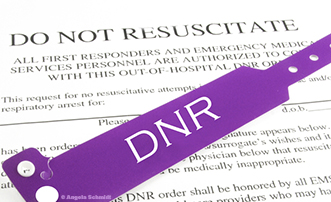The state of Wisconsin has a specific statute regarding this matter. Information about this statute can be found at the following web site: www.dhs.wisconsin.gov/ems/dnr.htm. There are criteria that must be met per the statute before a doctor can write an order for no resuscitation.
The following information is taken directly from the WI Department of Health Services (DHS) website.
Do-Not-Resuscitate (DNR) Information
Under Wis. Stat. ch. 154, subch. III, an attending physician may issue a do-not-resuscitate order for a “qualified patient,” as defined in Wis. Stat. § 154.17 (4).
As defined in Wis. Stat. § 154.17(2), a do-not-resuscitate order directs emergency medical technicians, first responders, and emergency health care facilities personnel not to attempt cardiopulmonary resuscitation on the person for whom the order is issued if that person suffers cardiac or respiratory arrest. The purpose of a do-not-resuscitate order is to ensure that medical care provided in the emergency department and out-of-hospital settings is consistent with the patient’s desire and the attending physician’s authorization.
DNR Bracelets
Do Not Resuscitate (DNR) bracelets identify a person with a valid DNR order.
Before the patient receives a bracelet:
- The attending physician must counsel the patient, the legal guardian, or the health care agent of an incapacitated patient
- The counseling session should include:
- Written information about DNR procedures.
- Documents noting the qualifying medical condition that warrants the DNR order (these documents will be placed in the patient’s file).
The discussion of a Do Not Resuscitate order starts with your primary care physician. If after your discussion, the doctor agrees that a DNR order is appropriate, they must complete a form that authorizes the request. There are two forms of bracelet. The first is a plastic bracelet that is like a hospital identification bracelet. There are inserts that need to be filled out with specific information and signed by the doctor. There should be no charge for this type of bracelet.
The second type of bracelet is a metal bracelet. The state of Wisconsin recommends a specific vendor to provide this bracelet, StickyJ Medical ID. You can find their contact information and an order form on the DHS website. You do have to provide the doctor’s authorization form to this company as well as the measurement of your wrist and there is a fee.
*Wis. Stat. ch. 154 reference:
http://docs.legis.wisconsin.gov/statutes/statutes/154




